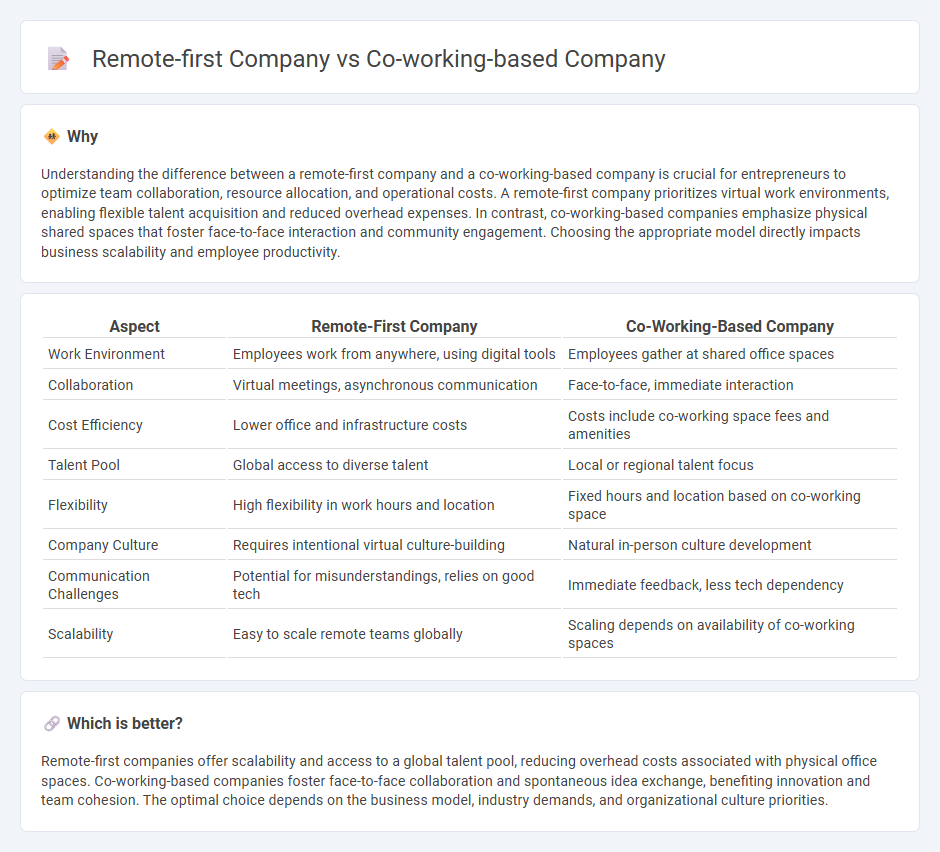
Remote-first companies leverage digital tools and flexible work environments to boost productivity, reduce overhead costs, and access global talent pools, enhancing innovation and agility. In contrast, co-working-based companies prioritize physical collaboration spaces that foster spontaneous interactions, community building, and real-time teamwork, supporting creative problem-solving and networking opportunities. Explore the benefits and challenges of each approach to determine which model best suits your entrepreneurial goals.
Why it is important
Understanding the difference between a remote-first company and a co-working-based company is crucial for entrepreneurs to optimize team collaboration, resource allocation, and operational costs. A remote-first company prioritizes virtual work environments, enabling flexible talent acquisition and reduced overhead expenses. In contrast, co-working-based companies emphasize physical shared spaces that foster face-to-face interaction and community engagement. Choosing the appropriate model directly impacts business scalability and employee productivity.
Comparison Table
| Aspect | Remote-First Company | Co-Working-Based Company |
|---|---|---|
| Work Environment | Employees work from anywhere, using digital tools | Employees gather at shared office spaces |
| Collaboration | Virtual meetings, asynchronous communication | Face-to-face, immediate interaction |
| Cost Efficiency | Lower office and infrastructure costs | Costs include co-working space fees and amenities |
| Talent Pool | Global access to diverse talent | Local or regional talent focus |
| Flexibility | High flexibility in work hours and location | Fixed hours and location based on co-working space |
| Company Culture | Requires intentional virtual culture-building | Natural in-person culture development |
| Communication Challenges | Potential for misunderstandings, relies on good tech | Immediate feedback, less tech dependency |
| Scalability | Easy to scale remote teams globally | Scaling depends on availability of co-working spaces |
Which is better?
Remote-first companies offer scalability and access to a global talent pool, reducing overhead costs associated with physical office spaces. Co-working-based companies foster face-to-face collaboration and spontaneous idea exchange, benefiting innovation and team cohesion. The optimal choice depends on the business model, industry demands, and organizational culture priorities.
Connection
Remote-first companies and co-working-based companies are connected through their shared emphasis on flexible work environments that enhance productivity and collaboration. Remote-first companies benefit from co-working spaces as they provide professional settings for employees seeking social interaction and focused work outside their homes. Both models support the evolving entrepreneurial landscape by promoting adaptability, networking opportunities, and resource-efficient operations.
Key Terms
**Co-working-based company:**
Co-working-based companies emphasize collaboration by providing shared physical workspaces designed to foster networking, creativity, and team synergy. These environments often feature flexible desk options, meeting rooms, and on-site amenities that support dynamic work styles and in-person interactions, boosting employee engagement and productivity. Explore the benefits and operational models of co-working-based companies to understand how they drive innovation and community culture.
Shared workspace
Co-working-based companies prioritize shared workspaces that foster collaboration, innovation, and a strong community culture by providing dedicated desks and meeting rooms. Remote-first companies offer flexible work environments where employees primarily work from home or various locations, limiting the use of physical shared office spaces. Explore how each model optimizes productivity and employee engagement in different work settings.
Networking opportunities
Co-working-based companies provide employees with dedicated physical spaces designed to foster spontaneous interactions and collaborative networking among diverse professionals. Remote-first companies leverage digital platforms and virtual events to create structured networking opportunities, often requiring intentional engagement to replicate in-person dynamics. Explore our detailed comparison to understand which model best enhances your professional connections.
Source and External Links
These Are The Largest Coworking Companies in The US - The largest coworking companies in the US include Regus, WeWork, Industrious, HQ, and Spaces, with Regus being the biggest having over 950 locations nationwide.
The Largest Coworking Companies in the World: 2025 List - Globally, top coworking companies are IWG (owner of Regus), WeWork, Industrious, and Servcorp known for extensive networks and premium workspace offerings.
10 Top Coworking Spaces in the US: WeWork, Regus and More - Key coworking providers like WeWork and Industrious offer flexible memberships, professional amenities, and community networking, catering to entrepreneurs, freelancers, and businesses of all sizes.
 dowidth.com
dowidth.com